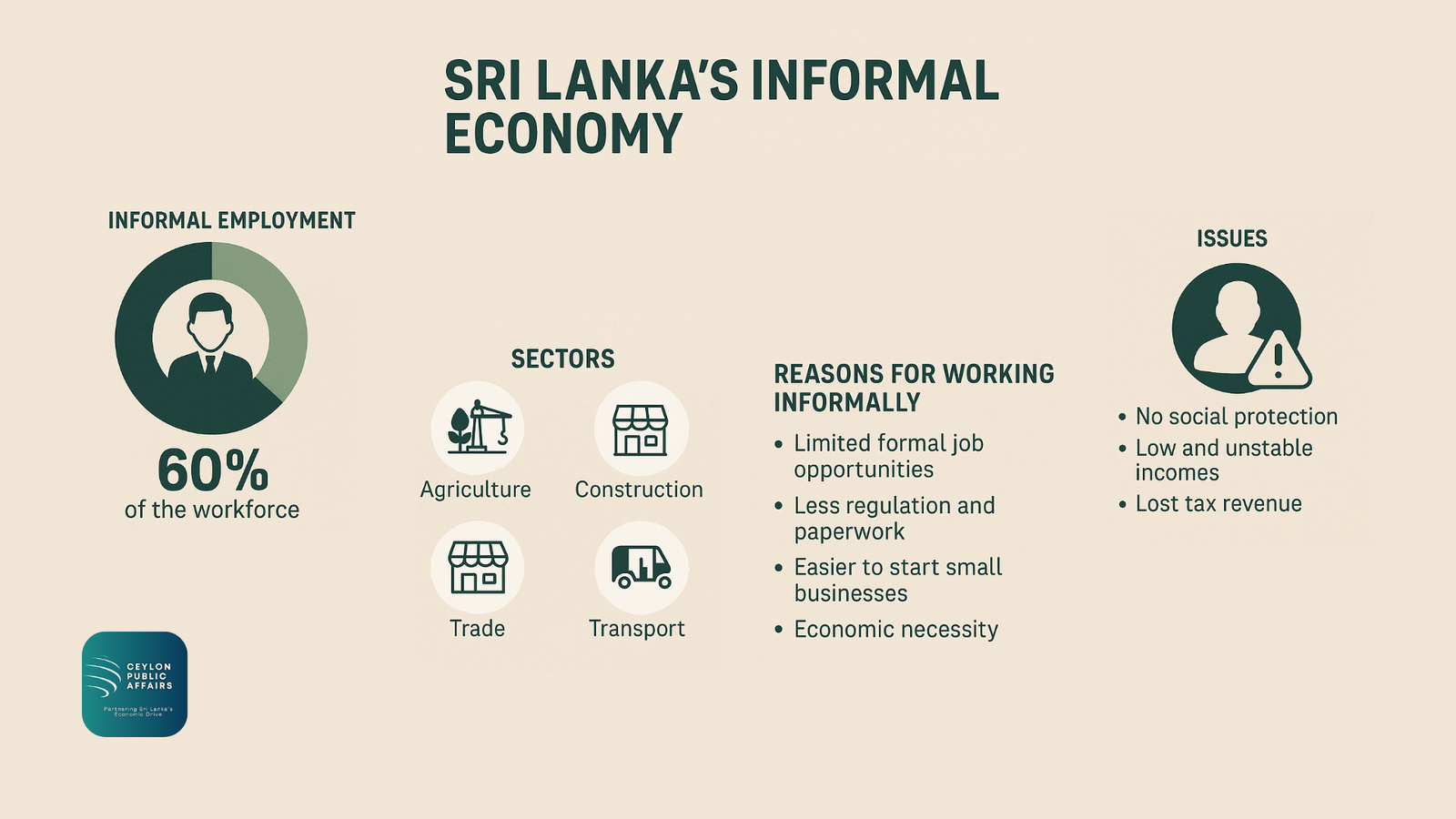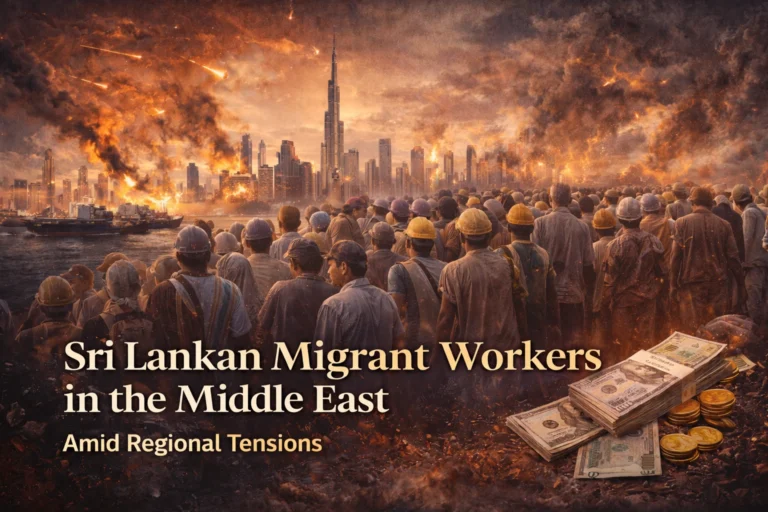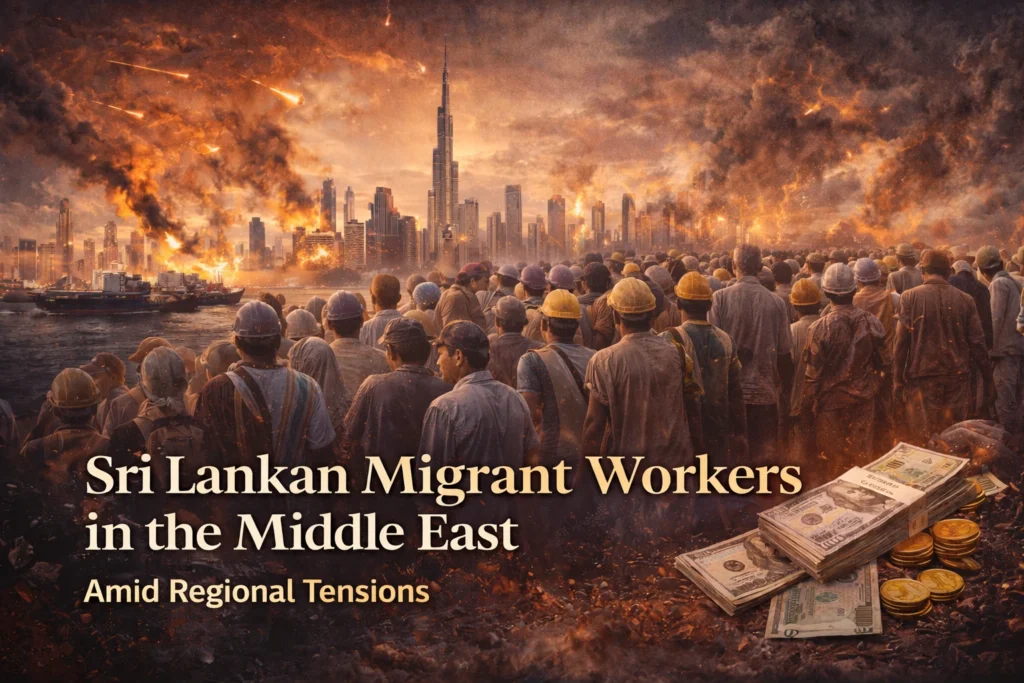The Informal Economy’s Silent Power | In Sri Lanka, conversations about the economy often revolve around GDP growth, foreign reserves, exports, and debt. Yet beneath the official numbers lies a vast, often overlooked engine of economic activity – the informal economy. It’s a world of street vendors, daily wage labourers, home-based seamstresses, tuk-tuk drivers, small-scale farmers, freelance service providers, and countless others who keep the country moving without ever showing up in formal employment statistics.
For policymakers, economists, and ordinary citizens alike, understanding the informal economy is not just a matter of curiosity – it’s essential for creating sustainable growth and tackling inequality.
What Is the Informal Economy?
The informal economy includes all economic activities that operate outside government regulation, taxation, and social protection systems. These activities are neither inherently illegal nor necessarily small in scale, but they often lack formal contracts, registration, or legal recognition.
In Sri Lanka, the informal sector covers a wide range of livelihoods – from micro-entrepreneurs selling snacks at railway stations to skilled technicians repairing electronics from home workshops. For many, this is not a choice driven by preference, but a necessity born from limited formal job opportunities.
How Big Is Sri Lanka’s Informal Economy?
Estimates vary, but international data suggests that over 50% of Sri Lanka’s workforce is engaged in informal employment. In rural areas, this figure can climb even higher. Agriculture, construction, transport, and small-scale retail dominate the sector, but informal work is also present in urban service industries and even within some export-linked supply chains.
Despite its size, the informal economy is largely invisible in GDP calculations and official statistics, meaning its true contribution to national growth is underestimated.
Why Do People Work in the Informal Economy?
There are several reasons why the informal economy remains so large:
- Limited formal job creation – Many industries simply cannot absorb the growing labour force.
- Ease of entry – Informal work requires less paperwork, fewer regulations, and little upfront capital.
- Regulatory complexity – For small businesses, formal registration can be costly and time-consuming.
- Economic shocks – During crises like COVID-19, many who lost formal jobs turned to informal work as a survival strategy.
For some, informality provides flexibility and independence. For others, it is a stopgap measure that can last decades.
The Double-Edged Sword
The informal economy’s impact on Sri Lanka is complex. On one hand, it creates livelihoods for millions, fosters entrepreneurship, and sustains community-level trade networks. On the other, it perpetuates economic vulnerability and inequality.
Positive contributions:
- Keeps unemployment figures lower than they otherwise would be.
- Encourages small-scale innovation and local solutions.
- Circulates money within communities.
Challenges:
- Workers lack health insurance, pension funds, or legal protection.
- No guaranteed income stability – a bad month can mean no food on the table.
- Governments lose tax revenue that could be reinvested into infrastructure and public services.
Inequality and the Informal Sector
One of the biggest socio-economic issues tied to informality is inequality. Informal workers are often stuck in a cycle where low earnings prevent them from investing in skills or business upgrades, keeping them trapped in low-productivity work.
Women, in particular, make up a significant share of the informal workforce – often in home-based or care-related roles – yet they remain largely invisible in policy planning. This invisibility contributes to gender wage gaps and limits women’s economic empowerment.
The Road to Formalisation — Without Disruption
Turning informal work into formal work is not as simple as passing new laws. In fact, heavy-handed enforcement can hurt livelihoods and push vulnerable workers further into poverty. Instead, Sri Lanka can explore gradual and supportive formalisation strategies:
- Simplify business registration – Reduce red tape and lower the cost of registering micro-enterprises.
- Provide incentives – Offer tax breaks, microcredit, or training for small businesses that formalise.
- Expand social protection – Create schemes that cover informal workers, such as contributory pension plans and health insurance.
- Use digital platforms – Connect informal service providers to larger markets via online marketplaces and payment systems.
- Community-based approaches – Work with local cooperatives and associations to bring workers into semi-formal networks.
A National Conversation We Need
The informal economy is not a problem to be eradicated – it is a reality to be understood, respected, and managed. Without it, millions would be jobless and countless families would lose their only source of income. But its current form leaves too many people vulnerable, without a safety net.
If Sri Lanka is to build a fairer and more resilient economy, policymakers must make space for informal workers in national development plans. Recognising their contributions, protecting their rights, and creating pathways to formalisation could transform the so-called “shadow” economy into a recognised pillar of growth.
The Bottom Line
The informal economy is not a hidden flaw in Sri Lanka’s system – it is one of its defining features. It is the marketplace at the street corner, the tuk-tuk ride to the office, the home-cooked lunch from a neighbour, the crafts sold at the Sunday fair. It is everywhere, yet rarely acknowledged.
If we want an economy that works for everyone, it’s time to shine a light on this silent powerhouse – and ensure that the millions working in it can share in the nation’s prosperity.
For more articles related to economy – https://ceylonpublicaffairs.com/













